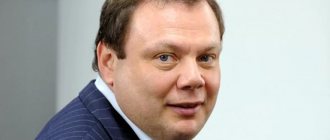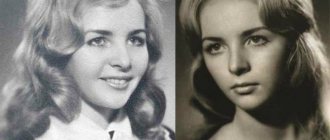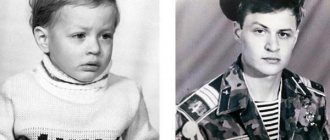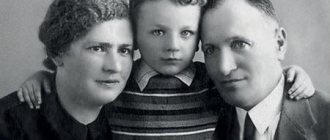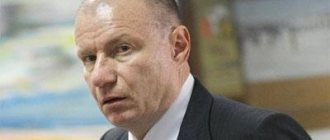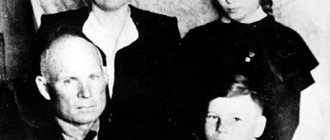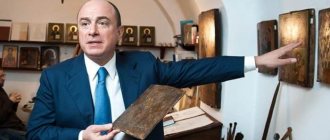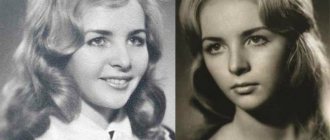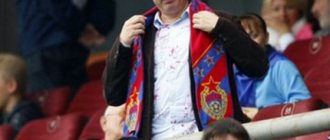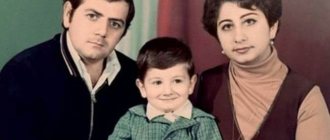Biography of Mikhail Khodorkovsky
Mikhail Khodorkovsky is a Russian entrepreneur, former head and co-owner of the Yukos oil corporation, who was arrested in 2003 on charges of tax evasion and major theft. In total, he spent more than 10 years behind bars, and at the end of 2013 he was pardoned by decree of Russian President Vladimir Putin.
In the photo: Mikhail Borisovich Khodorkovsky
Oppositionist to the Russian government, public figure, blogger, publicist. The main topics of his official Youtue channel were Russian society, the economy and his own views on the political situation in Russia.
Mikhail Khodorkovsky today
In 2021, the United Democrats Project was announced to provide relevant assistance to self-nominated candidates in the 2021 regional elections.
The project was financed with the direct support of Khodorkovsky.
Mikhail Borisovich is also the founder of the Dossier organization, which investigates corruption schemes on the part of the state leadership.
Khodorkovsky has his own channel on YouTube, as well as accounts on popular social networks.
When communicating with viewers, Mikhail often criticizes Vladimir Putin and the actions of the government. According to him, the country will not be able to develop safely as long as power is in the hands of current politicians.
Childhood, youth, family
Mikhail was born in 1963 into a Moscow family of engineers, Boris and Marina Khodorkovsky. Mikhail's parents were people from different social strata. Boris Moiseevich lost his father early and after military evacuation he lived with his mother and grandmother in the basement of a residential building. He often played homeless children, and sometimes he even had to beg on trains. Mikhail's mother, Marina Filippovna, was born into a wealthy family of a minister, and her family was noble.
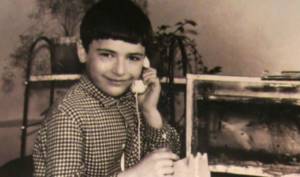
Mikhail Khodorkovsky in childhood
However, different fates did not prevent Mikhail’s parents from meeting and falling in love with each other. After the wedding, they settled in a communal apartment, and at the time of Misha’s birth they worked together at the Caliber precision measuring equipment plant.
The Khodorkovskys' communal neighbors were a crazy old man and his two children. Since her roommates were sick, Marina Filippovna was very afraid that little Misha would catch an infection from them. Mikhail also recalled that the family was often left without dinner - after neighbors sneezed next to pots and pans, their contents were thrown away.
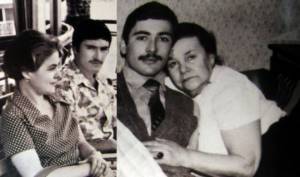
Mikhail Khodorkovsky with his mother and grandmother
In 1971, the Khodorkovskys received a separate two-room apartment. Boris Moiseevich was soon appointed to the position of chief designer of the plant, and Marina Filippovna continued to work as a process engineer. After the family’s life had improved relatively, Mikhail’s parents wanted to have a second child, but they never did.
According to the memoirs of Marina Khodorkovskaya, even before school, her son learned to do everything on his own. He knew how to clean the floor and washed small things himself. In kindergarten, teachers jokingly called the boy director, since his leadership abilities were already evident there.
From the first grade, Misha knew that while his parents were at work, he had to be independent: return from school, open the door with the key hanging on a cord around his neck, heat up food, wash the dishes and sit down to do his homework. Studying was easy for him, and in high school Misha was even nicknamed “the theorist.” The teenager really liked chemical experiments, mathematics and sports. He practiced sambo and worked part-time where he could to earn pocket money and reagents for experiments he was conducting on his own.
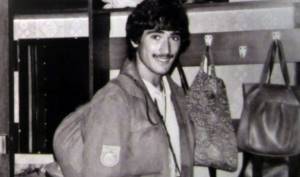
Mikhail Khodorkovsky as a student
In 1981, after graduating from school, Khodorkovsky entered the institute, choosing a chemical and technological university - Moscow Chemical Technology Institute. Here he, a born leader, not only joined the Komsomol work, but also led a construction team and independently looked for work for the guys during the summer holidays in Siberia. Mikhail was considered one of the best and most promising students and planned to become a candidate of science. But times began to change, and with them the plans of graduate Mikhail Khodorkovsky changed - he became a teacher and deputy secretary of the Komsomol at the university, and soon entered the Georgy Plekhanov Institute of National Economy, from which he graduated with a degree in financier.
In 1987, Khodorkovsky began entrepreneurial activity. In parallel with his studies, he and his Komsomol comrades created an intersectoral center for scientific and technical youth creativity (NTTM). Using connections from the Komsomol activists, he managed to knock out a large sum of money for the purchase of computers.
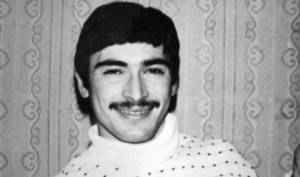
Mikhail Khodorkovsky in his youth
Despite the fact that the center was designed to develop creative initiatives, under the leadership of Khodorkovsky its employees began to engage in the import of PCs and the resale of alcohol. Mikhail was also involved in the “cooking” of denim jackets, which were fashionable at that time. Khodorkovsky and his comrades were among the first to start cashing out large sums. It was during those times that the initial capital of the future oligarch was created.
Personal life
Over the years of his biography, Khodorkovsky married twice.
He met his first wife, Elena Dobrovolskaya, during his student years. Soon the couple had a boy, Pavel.
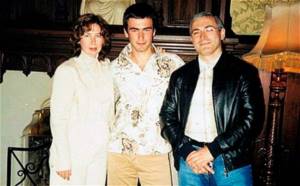
Khodorkovsky with his first wife and son
According to Mikhail, this marriage was not successful. However, the couple separated amicably and today continue to be on good terms.
The second time Khodorkovsky married an employee of the Menatep bank, Inna Valentinovna. The young people got married in 1991, at the height of the collapse of the USSR.
In this union, the couple had a girl, Anastasia, and two twins, Ilya and Gleb.
According to his mother, Khodorkovsky is an atheist. Moreover, many sources indicate that he believed in God while he was in prison.
Bank MENATEP
Khodorkovsky's income became so great that in 1989, Khodorkovsky and his associates Leonid Nevzlin and Alexey Golubovich became the founders of the first cooperative bank in Russia. Mikhail was elected chairman of the board of the MENATEP bank, which stood for “intersectoral scientific and technical programs,” and was practically the first to receive a license to operate from the State Bank of the USSR.
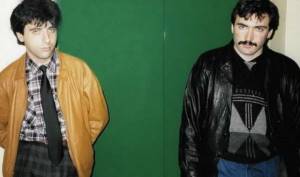
Mikhail Khodorkovsky and Leonid Nevzlin
This measure made it possible to serve not only the Ministry of Finance, but also the tax service, as well as Rosvooruzhenie. In the early 90s, after the collapse of the Soviet Union, MENATEP was one of the first to take part in schemes for the privatization of enterprises and companies.
The new industrial empire was growing - a separate organization, Rosprom, was created for it. Khodorkovsky recruited the best specialists to work in the new company. MENATEP privatized enterprises in the textile, food industry, construction and non-ferrous metallurgy, and mining companies.
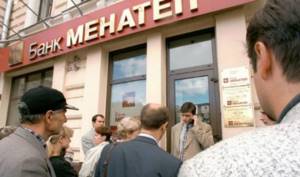
Bank Menatep is the brainchild of Khodorkovsky
In 1995, Khodorkovsky became the owner of the second largest Russian oil company. Then the state was unable to repay the loans taken from MENATEP, and 45% of the company’s shares were put up for a loans-for-shares auction, like many other enterprises. Mikhail managed to purchase them, and after that another 33% were bought at investment auctions. The competitors' applications, which were registered by MENATEP Bank, were simply disqualified, and for only $309 million, 78% of the shares of the company with the largest oil reserves passed into the hands of Khodorkovsky and his five partners.
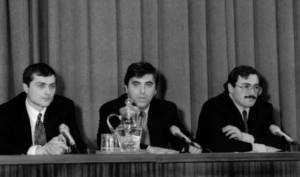
Vladislav Surkov, Leonid Nevzlin and Mikhail Khodorkovsky
The state's share was rapidly decreasing, and by the end of 1996 the bank became the owner of 90% of the shares of the oil company. Just a couple of years later, YUKOS capital grew to nine billion dollars. Mikhail Borisovich was no longer interested in the banking business; he switched to industrial development. “MENATEP” began to be run by hired employees who set up a branch in St. Petersburg, and then completely renamed it to “Trust”, having bought it from Khodorkovsky. During the default period of 1998, the bank failed to pay off its foreign currency loans and lost its license.
YUKOS
The industrial business that Khodorkovsky took up after leaving MENATEP helped him become so rich in record time that Forbes magazine placed him sixteenth on the list of the richest people in the world.
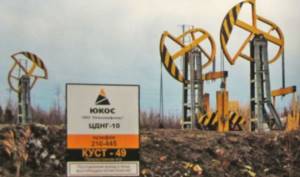
One of the Yukos fields
The entrepreneur began to actively lead the oil company out of the crisis, independently researching not only the oil production cycle, but also personally monitoring the process at all large Siberian oil refining companies. After the 1998 default, Mikhail Borisovich began to position himself as a law-abiding businessman in the West, paying large dividends. In the late 90s, the Moscow branch of YUKOS became central to the company. At the same time, Khodorkovsky created the Siberian Service Company, which was engaged in servicing oil fields.
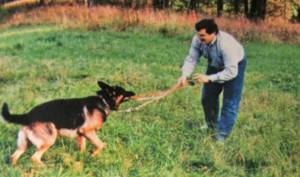
Mikhail Khodorkovsky in 1995
This time brought Khodorkovsky's holding company ownership of shares in oil companies in Samara, Tomsk and Yugansk. The conversion of shares in oil refineries in Syzran, Achinsk, Kuibyshev and Novokuibyshevsk provided Khodorkovsky with controlling stakes in these enterprises. After the second stage of reorganization, the transition to a single share and the exchange of shares of subsidiaries for shares of YUKOS, the company's share in their authorized capital was almost one hundred percent. In addition, the transparency of the company's activities has increased the value of its shares.
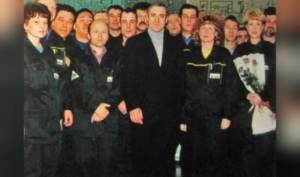
With rig workers
In addition to reforming management, the company's management used tax optimization methods. To minimize royalties, Khodorkovsky used all sorts of tricks and schemes that other oil companies used and thought of selling oil as “well fluid.” Mikhail Khodorkovsky: oligarchs. Yeltsin, prison In 1999, the company paid the tax authorities five times less than its competitor Lukoil and ten times less than Surgutneftegaz. With minimal costs, Mikhail Khodorkovsky's company was the leader in terms of oil production growth. All these actions could not help but attract the attention of the authorities to YUKOS.
Yukos case and arrest
According to Khodorkovsky himself, the point of no return that turned him into a defendant was the meeting of the business elite with Russian President Vladimir Putin on February 19, 2003: At that time, Khodorkovsky’s fortune was estimated at $15 billion, which made him the richest businessman in Russia. According to Khodorkovsky, a formal reason was then found in the form of a request from one of the State Duma deputies, Vladimir Yudin, about how legally the privatization of Apatit, a mining and processing plant, was carried out. The prosecutor's office opened a criminal case against structures controlled by YUKOS. How did the conflict between Khodorkovsky and Putin begin? He was charged with tax evasion and theft. The fact that an investigation was underway became known to the public after the arrest of Platon Lebedev, at that time the head of the MFO MENATEP. At the same time, the pile of further accusations against Khodorkovsky rapidly grew and an intensified tax audit of his activities was carried out.
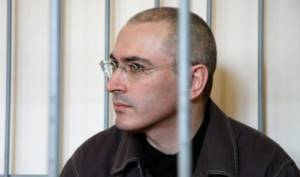
Mikhail Khodorkovsky was arrested in 2003
In October 2003, Khodorkovsky was detained at Tolmachevo airport in Novosibirsk. Mikhail was immediately sent to Moscow for interrogation, and then placed in “Matrosskaya Tishina”. The investigation was carried out in record time, and already in the early winter of 2003 it was transferred to court. Mikhail was accused of creating a criminal group, theft, tax evasion and much more. The list of accused was growing, and by the summer of 2005 there were already more than thirty counts in the indictment.
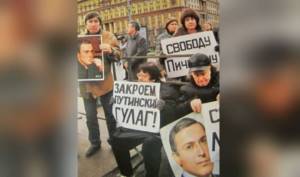
Picket in support of Khodorkovsky
YUKOS's accounts were frozen, as were its assets. Part of the money went to salaries of working employees, but a larger share was allocated to pay off the debt to the state. The trial of Khodorkovsky and Lebedev (their cases were combined) began in April 2004. The richest man in Russia was sentenced to 8 years and sent to the Krasnokamensk colony in the Chita region.
Khodorkovsky in prison
For a year, Mikhail Borisovich unsuccessfully tried to challenge his stay in a remote colony in court. Several times he was placed in a punishment cell for offenses, and in the spring of 2006, prisoner Alexander Kuchma cut Khodorkovsky’s face.
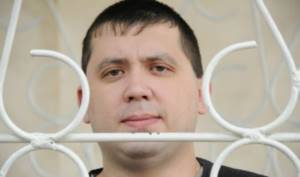
In the photo: Alexander Kuchma
Three years later, he filed a lawsuit against Khodorkovsky for five hundred thousand rubles. Kuchma demanded compensation for moral damages, insisting that the ex-head of YUKOS harassed him in the colony. The claim was rejected, and Alexander himself said a few years later that he was forced to cut Khodorkovsky and talk on camera about the harassment.
The end of 2006 brought new charges to Mikhail. New criminal cases were opened against Khodorkovsky and his partner Platon Lebedev for large-scale oil thefts. The indictment totaled fourteen volumes, and the perpetrators were transferred to Moscow.
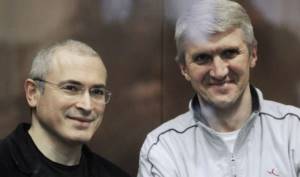
Mikhail Khodorkovsky and Platon Lebedev
Since 2009, hearings began on Khodorkovsky’s oil affairs, which excited the public. Boris Nemtsov and Irina Alekseeva, Daniil Granin and Boris Akunin, Yuri Luzhkov and Lyudmila Ulitskaya spoke out against the guilty verdict announced in 2010. Khodorkovsky himself called the charges absurd, because Mikhail was accused of stealing all the oil produced between 1998 and 2003.
According to the new charges, the businessman faced up to 22 years in prison. A year later, the court reduced the sentence to 14 years. In 2010, the convicts were sent to the Segezh colony in Karelia. It is noteworthy that the colony was considered troubled (years later, its head, Sergei Kossiev, was convicted of abuse of official powers), but, as Khodorkovsky later said, the three years that he spent there were relatively calm - he convinced his superiors that he would “lawlessly” without an answer will not work before the law, and did not hesitate to write complaints about the unacceptable behavior of employees.
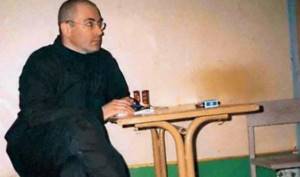
Mikhail Khodorkovsky in prison
Both the first and second cases against Khodorkovsky were considered by the European Court of Human Rights. The commission did not find political motives in the trials against Mikhail due to the lack of irrefutable evidence, although it recognized some violations of rights.
While in prison, Mikhail went on hunger strike four times. For four days, Khodorkovsky and Lebedev protested against the verdict. The next hunger strike was aimed against keeping Mikhail in solitary confinement. For another two weeks, already in the Chita pre-trial detention center, Khodorkovsky went on hunger strike, advocating for the release of sick prisoner Vasily Aleksanyan, who was eventually transferred to a clinic. And in the spring of 2010, he went on a hunger strike against the consideration of his second case and the extension of his prison term.
Mikhail Khodorkovsky. 17 hours at large At the end of 2013, information appeared in the media again that the Investigative Committee of the Russian Ministry of Internal Affairs was dealing with the third case of the disgraced oligarch, but a week later President Vladimir Putin signed a decree pardoning him. In the same year, Mikhail was hastily sent from the colony to St. Petersburg, from where he flew on a private plane to Berlin.
Mikhail Borisovich Khodorkovsky
Quotes
Russian oil is considered by the United States as an additional factor in the country's energy security. November 1, 2002
The Olympics in Sochi is a celebration of sports, but it should not be turned into a celebration of President V. Putin. December 22, 2013
I dream of uniting Ukraine and Russia within the European family. June 30, 2014
The decision of the Permanent Court of Arbitration in The Hague is fantastic. The company's shareholders received a chance to recover losses. July 28, 2014
We hope to build the Russia-China pipeline by 2005. June 21, 2001
I have no doubt that the decision on my release could always be made only by V. Putin. December 22, 2013
Knowing how the next 10 years would go, I’m afraid I would have shot myself. For me then, my current experience would have been a shock. June 24, 2013
In the short term, no sanctions will stop President Putin. April 30, 2014
My family was not touched, and for this I am grateful to V. Putin. December 22, 2013
We have created the Open Russia charitable foundation, its budget is more than 100 million US dollars/year. We teach tens of thousands of teachers to use the Internet as a tool in teaching. 2003
Since the times of the Roman Empire they have said: money has no smell. The rest is nonsense for idealists. Isn't that right, Mr. Dudley? November 21, 2012
I'm not interested in repeating my success. December 22, 2013
The construction of a private oil pipeline that would connect the producing enterprises of Western Siberia with the ice-free port of Murmansk is the only way to make the transportation of Russian oil to the United States profitable. February 27, 2003
Even very poor people have already understood: the destruction of the largest oil company in Russia did not add anything to their wallets, and it was not done for that. April 13, 2005
I am not going to return to business, neither the oil industry nor any other. December 22, 2013
I learned not to ask questions. December 22, 2013
Hide quotes Show all
Biography
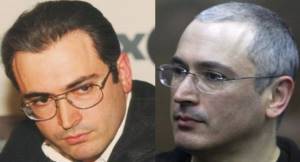
Mikhail Borisovich Khodorkovsky (Khodorovsky) was born in 1963 in Moscow.
In 1986 he graduated from the Moscow Institute of Chemical Technology. Mendeleev with a degree in engineer, chemical technologist.
In 1988 - Institute of National Economy named after. G.V. Plekhanov.
In 1986-1987 - Deputy Secretary of the Frunzensky District Committee of the Komsomol.
1987-1989 - Director of the Center for Scientific and Technical Creativity of Youth - Youth Initiative Fund. For some time, in parallel with his work at the NTTM Center, he worked as a carpenter.
In his own words, he received the first “big money” (160 thousand) from the Institute of High Temperatures for “special development”.
From May 1989 to 1990 - Chairman of the Board of the Commercial Innovation Bank for Scientific and Technical Progress, created by NTTM with the help of Zhilsotsbank.
In 1990, the bank bought NTTM from the executive committee of the Moscow City Council and renamed it “MENATEPinvest” (MENATEP - intersectoral and scientific-technical programs).
In 1990, he was an adviser to Russian Prime Minister Ivan Silaev.
1990-1991 - General Director of the interbank association MENATEP.
Since August 1991 - Chairman of the Board of Directors of the association of credit and financial enterprises MENATEP.
In 1992, he was appointed chairman of the Investment Fund for the Promotion of the Fuel and Energy Industry with the rights of Deputy Minister of Fuel and Energy of Russia. In this position he oversees private investments. Advisor to the Prime Minister of the Russian Federation.
In March 1993, he was appointed Deputy Minister of Fuel and Energy of Russia.
In April 1993, Khodorkovsky, together with Smolensky (Stolichny Bank), Gusinsky (MOST-Bank), Agapov (Kredobank), created an open-type joint-stock company with the code name “Plastic Cards of Russia” for issuing credit magnetic cards and for servicing settlements with foreign partners. Since September 1995 - Chairman of the Board of Directors of CJSC Rosprom.
In December 1995 A loans-for-shares auction was held for a 45% stake in YUKOS, combined with an investment competition for the sale of 33% of the company's shares. She won the competition and auction under the guarantee of MENATEP Bank. Laguna's total investment obligations amounted to $350 million. Soon after the loans-for-shares auction - in the spring of 1996. v MENATEP acquired a 7.06% stake in YUKOS at a cash auction.
In the fall of 1996 YUKOS issued an additional issue of shares, the proceeds from the placement of which were used to pay off the budget debt of the holding and its subsidiaries. Since April 20, 1996 Mikhail Khodorkovsky is the first vice-president of JSC Neftyanaya NK YUKOS.
Since February 1997 - Chairman of the Board of Management and Yukos for the management of the oil company.
Since 1998 After the reorganization of the work of the Yukos company, Mikhail Khodorkovsky became the chairman of the board of Yukos-Moscow LLC.
Since November 12, 1998 to October 1999 Khodorkovsky is a member of the Board of the Ministry of Fuel and Energy of the Russian Federation.
Since October 2000 - Member of the Bureau of the Russian Union of Industrialists and Entrepreneurs.
In 2001, Mikhail Khodorkovsky founded the Open Russia charitable foundation, the purpose of which was to implement projects in the field of culture and education, and develop the country's intellectual potential. Over time, Mikhail Khodorkovsky intended to completely switch to managing the fund, transferring the affairs of NK YUKOS to his colleagues.
On October 25, 2003, in Novosibirsk, Khodorkovsky’s plane was stormed by FSB special forces. Khodorkovsky is accused of violations during the privatization of OJSC Apatit in 1994 and is arrested. While in prison, Khodorkovsky resigns as head of the oil company. He does not want his arrest to affect thousands of Yukos employees.
In March 2004, the Vedomosti newspaper published the article The Crisis of Liberalism in Russia, transmitted by Khodorkovsky through his lawyers. The article causes a strong public response and gives rise to a discussion about ways of further development of Russian society.
On May 31, 2005, the capital's Meshchansky Court sentenced Khodorkovsky to nine years in prison to be served in a general regime colony.
Tax violations of Khodorkovsky:
Charges under 7 articles of the Criminal Code of the Russian Federation against M.B. Khodorkovsky. presented as a result of the investigation of the cases of OJSC Apatit, Research Institute of UIF and Closed Administrative Okrug Lesnoy. Here we will dwell on the “tricks” of YUKOS in the city of Lesnoy (formerly Sverdlovsk-45).
What are these ZATOs and what are they eaten with? In Soviet times, closed administrative-territorial entities (CLATEs) were islands of prosperity and a well-fed life. Having visited some of them on duty as a journalist, I never ceased to be surprised: in Moscow everything is on coupon cards, but here there are only cheeses behind the window, like in France. I’m talking about the city of Arzamas-16 (aka Sarov, aka Moscow-Center 300, aka Kremlev, aka Arzamas-75, etc.) In Sverdlovsk-45 they lived worse (far from the center), but tolerable. But in 1990-1991. everything suddenly changed dramatically. Closed cities have fallen into poverty (for information, about 2 million people live in 42 closed cities today). And it is unknown how events would have turned out further if the “Law on ZATO” had not been adopted in 1992. A very important law, thanks to which taxes collected in the territories of closed Minatom cities remained in city budgets. At the same time, the opportunity to receive subsidies from the center remained. At first, only 10 nuclear cities in Russia received such benefits. But over time, the law spread to other cities.
“It is not surprising that under the current taxation system, Russian nouveau riche began to actively register their companies in ZATOs,” says State Duma deputy, nuclear physicist, Doctor of Technical Sciences Ivan Nikitchuk (he worked at the nuclear facilities of ZATOs for a long time). — First of all, oil companies flocked to the closed city. A joint audit of the Ministry of Finance and the Ministry of Fuel and Energy showed that oil companies must pay 45% of revenue in taxes, but they pay at most 20%. We have repeatedly raised the question that the number of closed cities should be reduced and tax benefits cut. But there is no unanimity in our ranks: when considering the draft budget for the next year, the Government of the Russian Federation proposed to the State Duma of Russia to abolish the benefits of ZATOs. The deputies voted against it, and domestic offshore companies were preserved, which is what such thoughtful entrepreneurs as Mr. Khodorkovsky and Company use to this day.
Financial partisans YUKOS came to the city of Lesnoy in November 1999 after lengthy negotiations and weighing the pros and cons. The intelligence recruiter was the well-known businessman-banker Platon Lebedev. It was Menatep Bank that entered into an agreement with ZATO Lesnoy, registered several enterprises and received tax benefits worth 9 billion rubles (how many rural libraries and schools can be connected to the Internet?). Mr. Lebedev signed the agreement with the mayor of the city, Alexander Ivannikov. In total, 7 tax agreements “On the provision of targeted tax benefits” were concluded with commercial organizations. The total amount of tax benefits under these agreements amounted to 2138.2 million rubles. In this case, an offshore scheme provided by federal legislation was used. Alexander Ivannikov was guided by the federal law “On the Federal Budget for 1998,” which provided the right to establish additional benefits for taxes and fees (but only in agreement with the Ministry of Finance and in the manner prescribed by the Government of the Russian Federation). Mr. Ivannikov was also guided by government decree No. 595, which allows local governments to provide benefits on taxes and fees to legal entities registered as taxpayers with the tax authorities of ZATO. But, again, according to the law, benefits are not provided to everyone, but only to those who carry out at least 80% of their total economic activity in closed cities. YUKOS, like the Menatep bank, did not carry out any economic activity in the closed administrative town of Lesnoy. But all 4 registered in ZATO, Wald-Oil, Forest Oil and Mitra) built their relations with the local budget in a very unique way. So, for 1999 they were supposed to pay 2.2 billion rubles, but they pretty much surprised the city of Lesnoy by sending more than 6 billion rubles to the budget. Of these 6 billion rubles. more than 5 billion rubles amounted to Yukos bills maturing in 2000. The treasury of the city of Lesnoy (the revenue part of which in 1999 was equal to 428 million rubles) simply swelled: the budget surplus amounted to 5.3 billion rubles. At the same time, on the personal accounts of Business Oil LLC, Wald Oil LLC, Forest Oil LLC and Mitra LLC, there was a significant overpayment of taxes: by 3.8 billion rubles. The city of Lesnoy never received a lot of money. But all 4 companies demanded that the “debt” be returned. This was done in 2000. About 124 million “real” money was transferred to the deceiving firms to account for “overpaid” taxes.
In the same year, another performance with Yukos promissory notes was staged in the Lesnoy closed city. Deputies of the City Duma took part in this performance. They voted for the investment program for the construction and reconstruction of gas stations worth 2.73 billion rubles. To finance this program, 80 simple interest-bearing bills of the YUKOS company with a nominal value of 2.73 billion rubles, contributed by Business Oil LLC and others to the ZATO budget in payment of taxes, were used. Six months later, the project participants decided to sell these bills to the same companies. After 30 days, a new combination followed - an agreement was reached that the proceeds from the sale of promissory notes would be used to purchase promissory notes of YUKOS-FRS LLC with a maturity date no earlier than May 2003. An interesting point: the yield on YUKOS bills is 26%, and YUKOS-FRS - 10%. Based on all these facts, in the fall of 2001, a criminal case was initiated against the heads of the companies and the fathers of the city. But it was closed as quickly as it was opened. Today, investigators again took out the dusty volumes...
The Federal Tax Police Service of the Russian Federation conducted a terrible tax secret for 2002-2003. targeted work to document the illegal activities of the managers of OJSC Bank Menatep (chairman of the board M. B. Khodorkovsky) regarding non-receipt of tax payments to the budget. It was established that in the period from October 15, 1998 to May 18. 1999, funds in the amount of 4.7 billion rubles were written off from the settlement accounts of taxpayer clients (subsidiaries of OJSC NK YUKOS) OJSC Bank Menatep, but not credited to budget accounts. During the pre-investigation check, it was possible to collect comprehensive materials indicating the deliberate nature of the operations committed. As a result of the measures taken and an appeal in the Arbitration Court, the shareholders of OJSC Bank MENATEP repaid the bank's debt for tax payments not received to the budget in the amount of 2.122 billion rubles.
In 1999, OJSC NK YUKOS and the Ministry of Taxes of the Russian Federation signed a guarantee agreement No. 10-3-04/442dsp, according to which OJSC NK YUKOS assumed the obligation to pay the federal component of taxes for its subsidiaries and dependent companies. But this agreement was used by OJSC NK YUKOS to avoid paying the appropriate taxes for its subsidiaries. It was not possible to verify the implementation of the agreement due to the repeated refusal of both OJSC NK YUKOS and the Ministry of Taxes of the Russian Federation to submit this agreement and materials for its implementation.
The verification activities carried out by the Federal Tax Service of the Russian Federation showed that one of the main schemes for evading excise taxes in the production of fuels and lubricants in 1999-2001. on the part of the structures of OJSC NK YUKOS was the transfer of production capacities of oil refineries under fictitious lease agreements to organizations registered in the closed administrative city. Oil produced by subsidiaries of vertically integrated oil companies (VIOCs) was processed at the facilities of oil refineries leased by these organizations. At the same time, thanks to the benefits, tax payments and fees for refined oil were significantly reduced, and the profit received remained in the banks controlled by vertically integrated oil companies.
Currently, the Russian Ministry of Internal Affairs is checking materials on illegal reimbursement from the budget of excise duties for oil and oil products sold for export, which formally belonged to organizations registered in ZATO. The sale of these petroleum products on a commission basis was carried out by OJSC NK YUKOS and LLC TD YUKOS-M to fictitious companies, after which the relevant documents were presented to the Ministry of Taxes of Russia to receive reimbursement of excise taxes from the budget. The amount of damage is estimated at 7 billion rubles.
A set of operational investigative and verification measures is being carried out in relation to the financial and economic activities of OJSC NK YUKOS and CJSC VK YUKES when transferring foreign currency earnings from the sale of oil and petroleum products abroad in 1997 through CJSC Credit Lyon Russbank. According to the data available to operatives, as a result of the transaction, about $80 million were not reflected in the tax and currency accounts of OJSC NK YUKOS, which resulted in non-payment of the corresponding taxes and fees.
The difficulty in documenting the illegal activities of the management of OJSC NK YUKOS is explained by the “failure to submit relevant documentation to the tax police for a long time.” The same position was occupied for a long time by the leadership of the Ministry of Taxes and Taxes of the Russian Federation, which tried to refer to “tax secrecy.” There is reliable information that Minister G. M. Bukaev gave such instructions to his territorial divisions that it was simply impossible to carry out an objective audit of large taxpayers.
The editors have at their disposal solid documents confirming all of the above facts. Here is one of the documents, namely the response of the Prosecutor General's Office of the Russian Federation to a request from State Duma deputy M.E. Buger (request letter No. BM-689 dated June 05, 2003) regarding the issue of transfer pricing and the insignificant amount of deductions for tax payments of large Russian oil companies companies such as OJSC NK YUKOS and OJSC Sibneft (income tax) in the period 2000-2002. (The Prosecutor General's Office of the Russian Federation sent a copy of the deputy's request to the Ministry of Taxes and Taxes of the Russian Federation No. 37-34/98 dated June 10, 2003). The answer was simple: “The Interregional Inspectorate of the Ministry of Taxes of the Russian Federation for the largest taxpayers No. 1 on an ongoing basis conducts desk audits of OJSC NK YUKOS and OJSC Sibneft, including tax control measures in relation to “export” VAT. The inspection did not establish any violations of the law by these organizations during such inspections.” YUKOS has always been able to work competently with inspectors...
Criminal case No. 135070 After the tax police began checking transactions with promissory notes, Business Oil, Wald-Oil, Forest Oil and Mitra were removed from tax registration in the closed city of Lesnoy and merged into the Buryat LLC "Perspective Optium". In May 2001, Perspektiva Optium structurally became part of Investproekt LLC, registered in the Chita region. Today, according to tax police officers, traces of this company have been lost somewhere. This LLC is nowhere to be found on tax records.
What's interesting? The general directors of all four companies that disappeared (first in the Buryat steppes, and later in the forests of the Chita region) were residents of Moscow, and the executive directors were residents of the Closed Administrative Okrug of Lesnoy. During the preliminary investigation, “it was not possible to identify the person who committed the crime” (this phrase is taken from the investigation materials). That is, based on the materials available to the preliminary investigation, it is currently impossible to make an unambiguous conclusion about who exactly among the managers of NK YUKOS, Business Oil LLC, Mitra LLC, Forest Oil LLC, Wald LLC Oil" and the municipal district of Lesnoy committed tax evasion. The general directors questioned as witnesses, certain Messrs. Spirichev, Chernikova, Kartashov and Karaseva, testified that their Tax payments were made both in monetary and non-monetary form by transferring promissory notes of OJSC NK YUKOS to the FBU of Lesnoy. They allegedly did not know that from January 1, 1999, tax payments, according to the Tax Code of the Russian Federation, should be made only in cash. The inspection of the Ministry of Taxes of the Russian Federation for the city of Lesnoy did not make any claims regarding the implementation of tax payments by bills of exchange (did they receive instructions from above?).
The head of the Tax Inspectorate of the Russian Federation for the city of Lesnoy, Kafidov S.G., was also invited for questioning, who testified that until 2000, information about tax payments made by taxpayers came from the Financial Department of the administration of the city of Lesnoy. If the tax payment was made in kind, a notification was sent from the Financial Administration to the administration about how much and which taxpayer should be credited. The fact that since January 1, 1999 the Tax Code of the Russian Federation has prohibited making tax payments in non-monetary form is unknown to Mr. S. G. Kafidov. When a non-monetary payment was received, he was guided by the resolution of the City Duma “Moscow Region of Lesnoy”.
During the preliminary investigation, no one was charged. But the period of preliminary investigation in the criminal case was extended by the prosecutor's office of the Sverdlovsk region for another 4 months (until January 3, 2002). Later it was extended for another 2 months. And then? Then the preliminary investigation in criminal case No. 135070 was suspended, and employees of the OS of the Federal Tax Service of the Russian Federation for the Sverdlovsk Region were tasked with “taking measures to identify the person(s) to be charged as an accused in this criminal case.” A copy of this resolution was sent to the Office of the Prosecutor General for the Urals Federal District. It was March last year, 2002.
On June 28, 2005, in the newspaper Izvestia, as an advertisement, a “letter of fifty” was published - “Appeal from cultural figures, scientists, and members of the public in connection with the sentence imposed on the former leaders of the Yukos oil company”, expressing support for the guilty verdict. The authors of the letter expressed dissatisfaction with the fact that “the voices of those who doubt the fairness of the decisions made have been heard with renewed vigor,” and the discussion of the verdict, in their opinion, “is in the nature of discrediting the entire judicial system, the state and society and calls into question the foundations of law and order in the country " On September 11, 2009, four years after the publication of the “letter of fifty,” the famous figure skater Irina Rodnina stated that she did not sign this letter and condemned the very form of such an appeal. Another of the signatories, Anastasia Volochkova, on February 2, 2011, in an interview with Radio Liberty, explained her signature as a misunderstanding, as a result of which she was misled by United Russia about the contents of the letter. As part of the same Radio Liberty project, on February 4, 2011, Alexander Buinov expressed regret about his signature under this letter: “I have a feeling that I got into trouble then. In any case, there are crazy actions that are embarrassing... If an interview with Radio Liberty is enough for me to renounce, I’m ready to say it now.”
In July 2005, Alfred Koch claimed that the business community learned that Khodorkovsky was a democrat after he was sent to prison, until that moment he was considered a successful businessman and a clever swindler.
On November 18, 2005, the US Senate adopted resolution No. 232, prepared by Senators Obama, Biden and McCain, regarding the criminal prosecution of Khodorkovsky and Lebedev. The resolution, in particular, said: “In judicial investigations that pose a threat to the authorities, the court in Russia is an instrument of the Kremlin; such a court cannot be responsible and independent.”
In connection with the presentation of new charges in 2006, the US State Department again harshly criticized the Russian authorities, pointing out that these charges raise serious questions regarding the rule of law in Russia, the independence of the courts, the enforcement of contracts, the integrity of property, and the lack of predictable tax policy in Russia .
Khodorkovsky's lawyer Robert Amsterdam published a white paper in 2007 alleging abuses of state power in the Russian Federation, citing violations of the law in the prosecution of Khodorkovsky and his colleagues.
In July 2008, the radio station Ekho Moskvy claimed that Russian and international human rights organizations consider Khodorkovsky a political prisoner.
In July 2009, Lyudmila Alekseeva wrote that in her opinion, “the most important thing in the case of the ex-YUKOS leaders is not its extreme politicization, but the complete absence of justice in it.” Repeatedly attending court hearings in the Khamovnichesky Court, Alekseeva noted that in the YUKOS case the law was being violated in the most blatant and malicious manner.
Natalya Fateeva called the YUKOS case “lawlessness and theft.” The People's Artist of Russia believes that “even a person who is not armed with the knowledge of jurisprudence, having intelligence, can very quickly understand that all this is such a fake, which is simply surprising.”
The editors of ECHO Planet calculated that to steal 350 million tons of oil, trains with a total length of 122,500 kilometers would be needed.
On October 17, 2010, director Stanislav Govorukhin said in the Pozner program on Channel One that he did not regret signing “Letter 50”, supporting the criminal prosecution of Khodorkovsky, explaining this: No, I don’t regret it. Of course, I don’t really understand all this background, that is, I understand it, but I probably won’t be able to express it. But something else confuses me. Khodorkovsky’s right hand, a certain Nevzlin, a character familiar to you, was sentenced to life, in absentia, it’s true.<…> Khodorkovsky’s right hand too - he had two right hands - Alexey Pichugin was sentenced to life for proven contract killings. At one time, when the mayor of Nefteyugansk, Vladimir Petukhov, was killed, the whole of Nefteyugansk - Khodorkovsky was not yet imprisoned - came out with posters to the demonstration, on which it was written: “Khodorkovsky is a murderer.” It is very difficult to assume that Khodorkovsky did not know any of this and was not involved in it, you will agree. That's why I signed this letter. Vladimir Vladimirovich Putin admitted this not so long ago - that, in many respects, everything happens because this person is involved in these incidents.
In September 2010, Russian Prime Minister V. Putin called Khodorkovsky a murderer and bandit. This topic, in the context of the murder of Mayor Petukhov, was actively discussed by state media for many years, with an emphasis on the fact that the murder occurred on Khodorkovsky’s 35th birthday and was allegedly a birthday present for him. Despite this, charges of involvement in the murder of Petukhov on June 26, 1998, or other murders that were incriminated against Khodorkovsky’s subordinate, the head of the YUKOS security service Pichugin, were not brought against the head of the company by the investigation or the court. After his release in December 2013, Khodorkovsky especially noted that the mystery of the entire investigation remains, “why this club - the organization of murders - was never put into action by the investigation?” The businessman always maintained that he had nothing to do with the murder of Mayor Petukhov.
On December 30, 2010, after the announcement of the guilty verdict, Khodorkovsky’s lawyer Vadim Klyuvgant called the incident “a criminal massacre and a falsified case.” The lawyer announced his intentions to initiate criminal prosecution of all those involved in this case.
Opening the meeting of the European Parliament's subcommittee on human rights on January 10, 2011, its head, MP from Finland Heidi Hautala, called the decision of the Khamovnichesky court “a failure of the Russian judicial system, exposing President Medvedev’s modernization program to ridicule.”
In July 2012, VTB Bank President Andrei Kostin, speaking on BBC television, announced the advisability of releasing Khodorkovsky, arguing that the entrepreneur had already served enough time and it would be useful for V. Putin to release him now.
Hunger strikes. Khodorkovsky went on hunger strikes four times during his imprisonment.
He first went on a dry hunger strike on August 23, 2005, as a sign of solidarity with Platon Lebedev, who was being held in a punishment cell. It was terminated on August 26, when Khodorkovsky learned about Lebedev’s transfer from the punishment cell to a general cell.
At the beginning of May 2006, Khodorkovsky went on a “dry” hunger strike, protesting against being placed in solitary confinement.
At the end of January 2008, while in a pre-trial detention center in Chita, Khodorkovsky went on a hunger strike, demanding the release of the seriously ill Vasily Aleksanyan from custody. This hunger strike lasted two weeks. At first it was “dry,” but a few days later the ex-head of YUKOS began drinking water. The hunger strike was stopped due to Aleksanyan’s transfer to a civilian clinic.
On May 17, 2010, Khodorkovsky went on a hunger strike due to the fact that the court hearing the second case extended his detention. Khodorkovsky considered the extension of the arrest to be contrary to the new law, which prohibits the detention of those accused of economic crimes without sufficient grounds. After the press secretary of Russian President D. Medvedev reported that the head of state was familiar with the contents of Khodorkovsky’s letter to the chairman of the Supreme Court of the Russian Federation, on May 19, Khodorkovsky stopped his hunger strike.
Liberation.
Mikhail Khodorkovsky at the first press conference after his release, December 22, 2013. On December 20, 2013, V. Putin signed the Decree “On the pardon of M. B. Khodorkovsky.” He was released at night, so hastily that Khodorkovsky was not given a certificate of release, nor was he given time to change his prisoner’s suit to civilian clothes. He left the colony in Segezha in an official car of the Federal Penitentiary Service, which proceeded to the Reception House of the Federal Penitentiary Service, and from there to the Petrozavodsk airport. There, a standard Tu-134 plane was waiting for him, on which Khodorkovsky arrived at St. Petersburg Pulkovo Airport, where he was released by a convoy. From Pulkovo on a private Cessna plane provided by former German Foreign Minister Hans-Dietrich Genscher, he flew to Berlin.
The one-year Schengen visa was added to the foreign passport issued in the colony upon arrival in Germany. In a special statement from Khodorkovsky, distributed upon his arrival in Berlin, it was clarified that the question of admitting guilt was not raised in the petition for pardon due to family circumstances sent to Putin on November 12. For 2.5 years, the German government sought Khodorkovsky’s release through closed diplomatic channels: this issue was twice raised at meetings with Putin by former German Foreign Minister Hans-Dietrich Genscher; According to the testimony of the scientific director of the German-Russian Forum, political scientist Alexander Rahr, the topic was constantly raised at meetings between representatives of Germany and Russia. According to Genscher, he was motivated by humanitarian considerations in relation to a person with whom he had met several times before. The release of Khodorkovsky was welcomed by the authorities of the USA, Great Britain, Germany, and the European Union. On the night of December 22, 2013, while in Berlin, Khodorkovsky gave his first free television interview to Dozhd channel journalists Ksenia Sobchak and Mikhail Zygar. At a large press conference in Berlin at the Berlin Wall Museum at the former Checkpoint Charlie on December 22, Khodorkovsky announced that after gaining freedom he had no plans to engage in business or politics or sponsor the Russian opposition; he intends to concentrate on social activities, including the release of political prisoners in Russia
Political activity
Back in 2003, while in a pre-trial detention center, Khodorkovsky wrote a long article entitled “Left Turn,” which shook up civil society.
Thanks to her, Mikhail began to be considered the country's main political prisoner. Then several books were published, written by Khodorkovsky during his stay in prison. In them, he reflected on changes in Russian society under different scenarios. After his release, he repeatedly stated that he would engage in social activities, in particular, to promote the release of political prisoners in Russia. In 2014, Mikhail was invited as a peacekeeper to Kyiv. He spoke on Maidan criticizing the Russian authorities and in support of Ukrainians defending their independence. Khodorkovsky also tried to travel to Donetsk, where the protests began, but the armed men did not let him through. In the same year, Mikhail was spotted at an online conference for the relaunch of the Open Russia website.
In 2014, at the Paris festival for the seventieth anniversary of the French publication Le Monde, Mikhail Borisovich said that he was ready to take the presidency in Russia, and his first task in this post was to carry out a constitutional reform to redistribute “presidential power in favor of the court, parliament and civil society.” Who framed Khodorkovsky? In 2021, a film about Mikhail Khodorkovsky “Citizen X” was shown at the Venice Film Festival, and in the summer Nezavisimaya Gazeta noted that the businessman began to speak more kindly about the Russian opposition, as well as about civil servants and even about the existing government.
How and where does Mikhail Khodorkovsky live?
Contents
hide
How and where does Mikhail Khodorkovsky live?
Khodorkovsky's real estate in Russia
What is Mikhail Khodorkovsky doing now?
Khodorkovsky indirectly admitted guilt in a letter to Putin
Mikhail Khodorkovsky lives with his family in London. The disgraced oligarch moved to the capital of Great Britain in 2015, two years after his release from prison. He owns a country mansion, and he permanently lives in apartments in an elite residential complex.
This is not all of Khodorkovsky’s real estate: he owns a villa in Switzerland and a mansion on Rublevskoye Highway in the Moscow region. The total value of the property exceeds 10 million dollars.
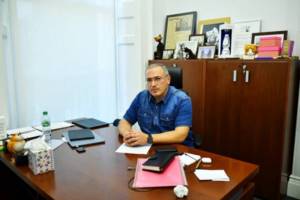
After serving his sentence, Mikhail Khodorkovsky left Russia - he flew to Germany, and from there to Switzerland. The billionaire’s wife and children lived in Switzerland at that time. The reunited family spent 2 years there, after which they moved to the UK.
Mikhail Khodorkovsky said that he would no longer be involved in politics. However, there is an Open Russia office in Westminster. Working for the organization has been his main activity in recent years. Open Russia is not limited to public activities. The office is located near the Parliament building.
The Russian businessman also has a two-story mansion outside the city - it is located in East Sussex. In this part of England, property is cheaper than in the capital, but the neighbors are prosperous people. Among them are English millionaires, movie and pop stars. The average cost of a cottage in this area is from 1 to 3 million pounds.
Personal life of Mikhail Khdorovsky
Mikhail got married for the first time in the 80s, while still a student. His wife was fellow student Elena Dobrovolskaya. They became close thanks to social and Komsomol activities at the institute.
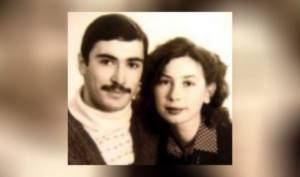
The first wife of Mikhail Khodorkovsky - Elena Dobrovolskaya
However, the characters of Mikhail and Elena turned out to be completely different, so even the birth of their son Pavel in 1985 did not save their family. They divorced peacefully, without blaming each other for anything. Khodorkovsky never forgot about his first wife and son and always helped. Later, Mikhail provided his son with education abroad, after which Pavel settled in America and got married.
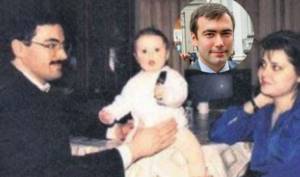
Pavel, Khodorkovsky's eldest son
Mikhail met his second wife, Inna, while still married to Elena. However, their acquaintance was exclusively work-related - the girl worked as a currency expert at the MENATEP bank. After Khodorkovsky’s divorce, the lovers began dating, and they married after the birth of their daughter Anastasia, in 1991.
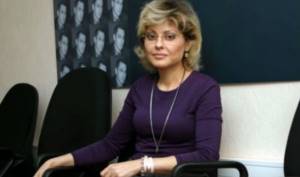
Inna Khodorkovskaya
In 1999, the couple also had twin boys - Ilya and Gleb. During all 10 years of imprisonment, Inna Valentinovna waited and supported her husband. After a series of difficult events ended, Khodorkovsky settled with his family abroad and received a residence permit in Switzerland.
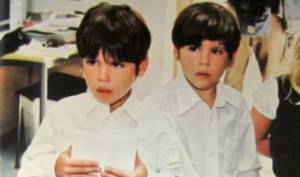
Younger sons - Ilya and Gleb
The private life of Mikhail Khodorkovsky
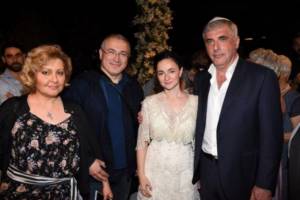
The businessman broke up with his first wife Elena, while maintaining a warm relationship with her. Son Pavel lives in America and is raising his daughter Diana, born in 2009.
The second marriage, according to Mikhail, turned out to be more successful. His wife Inna gave him three children: daughter Anastasia, twins Gleb and Ilya. The brothers are educated in Switzerland.
In 2014, Khodorkovsky moved with his family to Switzerland, where he lived, renting a villa for 11,500 francs per month. At the same time I received a residence permit.
In 2021 he moved to London, where he now lives.
Has the following awards:
- literary prize from the magazine “Znamya” for “Dialogues” with L. Ulitskaya;
- diploma of the Andrei Sakharov Prize “For Journalism as an Act”;
- the Dr. Rainer Hildebrandt Medal for Human Rights Activities;
- Lech Walesa Prize. Donated the money received to charity
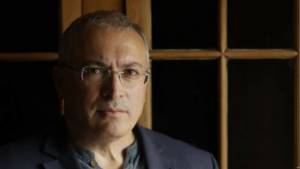
Considers himself an atheist.
Mikhail Khodorkovsky now
According to Mikhail Borisovich himself, he still “lives in Russia”, dealing with its problems. He actively communicates with Russian subscribers on the Internet and is very worried about the political and economic situation in his home country. Mikhail also continues to be the owner of the socio-political publication MBKh-Media, founded by him in 2021.
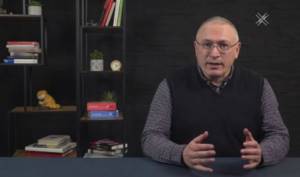
Now Mikhail Khodorkovsky runs his own YouTube channel.
In 2021, he published his new book “New Russia or Gardarika” with ten political commandments from Khodorkovsky.
Khodorkovsky's real estate in Russia
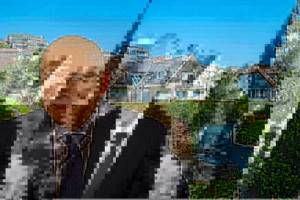
Mikhail Borisovich owns real estate not only in Switzerland and the UK. He remains the owner of the mansion on Rublyovka, which, according to the NTV channel, is rented for at least 800 thousand rubles per month. In the village of Yablonevy Sad, the owners of YUKOS lived in elite mansions: Khodorkovsky, Nevzlin, Lebedev, as well as Brudno and Dubov. Now all the owners live abroad, and real estate is rented out at high prices. Despite this, there are no vacant houses in the village.
After his release from prison, Khodorkovsky did not come to Russia. The fact that he does not sell real estate in the Russian Federation may indicate the hope of someday returning to his homeland.
